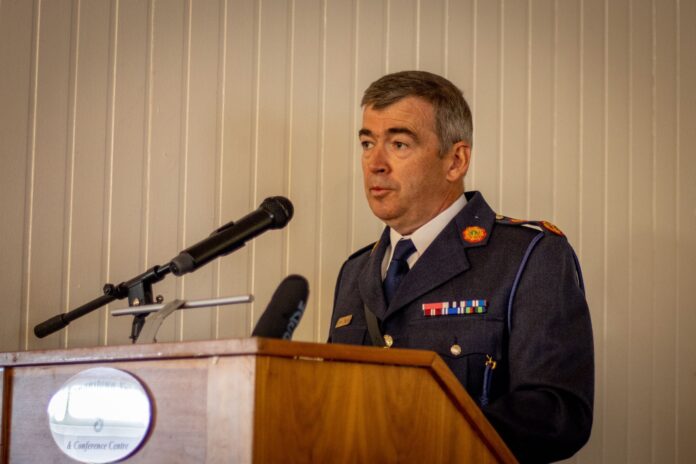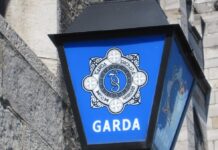
by David Raleigh
GARDA Commissioner Drew Harris has been asked to review the suspensions of eight Limerick gardaí as part of an investigation into the suspected cancellation of penalty points and to reinstate them as soon as possible.
The call was made at this week’s Garda Representative Association (GRA) conference in Killarney by colleagues of the gardaí who have been suspended from duty for over a year.
Delegates were told that the eight gardaí haven’t been charged with any offence, that no evidence has been put to them, and that they remain in limbo regarding their future in the force.
There was unanimous support for a motion calling on Commissioner Harris to “conduct a full scale review of the current protocols and guidelines policy on the suspension of members of An Garda Síochána with a view to refraining from suspending members where possible, and placing a far greater emphasis on the retention of members in the workplace”.
The motion, which was proposed by Limerick-based Garda Cathal O’Gorman, also called on the Commissioner to publish a corresponding report “containing clear guidelines and procedures”.
Gardaí complained that Garda management have more respect for animals than for the GRA.
The eight suspensions sanctioned by Garda management as part of a long-running probe into alleged corruption in public office, which has been described in the Dáil as “a witch trial”, with a number of TDs arguing that that Garda discretion and Garda corruption are not the same.
Gardaí have expressed fears that they could find themselves suspended for simply following the Garda code of ethics, which were established by the Policing Authority, and which state that gardaí are “required to exercise considerable discretion in fulfilling their responsibilities”.
Garda Headquarters recently highlighted a report published by the Policing Authority last July which covered the performance of gardaí during the Covid pandemic, and which noted the “exercise of discretion is entirely different from any tendency to show preference”.
“There has been some conflation of these two concepts in public commentary and it is necessary that the important distinction be emphasised”, the report went on.
The report, which does not comment on any specific incidents, added: “The law binds us equally, and while there is a proper place for the exercise of discretion in determining the best course of action where an immediate decision is required, being well known or knowing a guard, of whatever rank, is not a pathway to more favourably treatment.”
Addressing his GRA colleagues, Garda O’Gorman said the Limerick Garda Division has suffered “years of turmoil” due to the long-running probe led by the Garda National Bureau of Criminal Investigation.
He said “humanity died in An Garda Síochána, with the suspending of our colleagues in the southern region”.
“One of our members suspended was back at work after a long illness for just three hours; two more of these members were on sick leave after a garda vehicle they were travelling in was struck by another vehicle, while they were on duty and attempting to preserve life, which is our duty and something we do without fear or favour,” Garda O’Gorman said.
“What has happened in the intervening period, absolutely nothing; no interview, no arrest, no phone call, no text message, not a word. No evidence has been presented whatsoever. What happened to being innocent until proven guilty? One wonders what is going on here?”
“Our colleagues have been stripped of their badges, their warrant cards, they’ve been stripped of their jobs, stripped of their dignity, stripped financially, and they have been left ostracised in An Garda Síochána.”
“We have been provided with the services of an app KOPS (Keeping Ourselves Supported), or is it Keeping Ourselves Suspended? Suspended members have no access to this app, how are they going to access it? These are the ones that need it more, like the people that are on sick leave.”
“Instead, they have to sit at home, not be allowed work, their mental health is in tatters, their stress levels have gone through the roof, marriages and family life are on tenterhooks because they were suspended in November 2020, and over a year later, not one shred of evidence has been put to them.”
“We have very high-ranking officers more than willing to have these people reinstated in these jobs, but it is not happening. It is not being allowed happen, and why is that? Who is not allowing these hardworking gardaí back to work, and how many cases in our court system are in trouble because of these suspensions?”
“Having gardaí sitting at home while they are being allegedly investigated without any evidence being put to them is just ridiculous.“
GRA President Frank Thornton, who is also serving as a Garda in Limerick, told the delegates that since the eight suspensions last year “it has been nothing but horrific within the Limerick Division”.
“It’s just harrowing day in day out. Our colleagues are emotional, and that’s everyday for us, because we cannot understand why or how this is continuing to infect into our division, and obviously the surrounding divisions are being infected too.”
Nationally, there are currently 81 gardaí suspended from duties.
Responding to the concerns expressed by GRA members, a Garda Headquarters spokesperson replied: “An Garda Síochána does not comment on individual internal disciplinary matters or matters that are currently subject of criminal investigations or on remarks made by third parties, including the representative associations.”
The spokesperson said the suspension of gardaí “is a statutory process governed by the Garda Síochána (Discipline) Regulations 2007, as amended” and that internal Garda policy “clearly states the considerations to be taken in respect of the suspension of members”.
“The policy also specifically provides for the welfare of members subject to suspension including ongoing access to the Employee Assistance Service, regular contact by an appointed Liaison Officer, and information on promotion and other vacancy opportunities.”
The spokesperson added that “except in certain, very limited circumstances, members of An Garda Síochána continue to receive an allowance equivalent to 100 per cent of basic pay while on suspension”.









